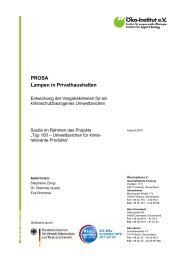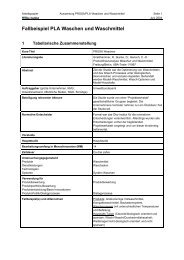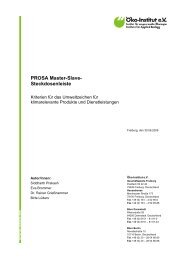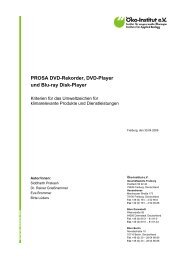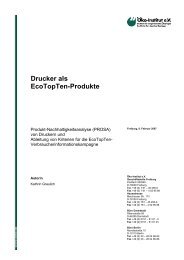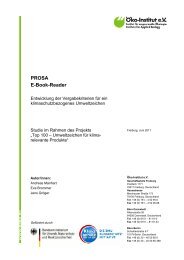PROSA – Product Sustainability Assessment - PROSA - Produkt ...
PROSA – Product Sustainability Assessment - PROSA - Produkt ...
PROSA – Product Sustainability Assessment - PROSA - Produkt ...
Erfolgreiche ePaper selbst erstellen
Machen Sie aus Ihren PDF Publikationen ein blätterbares Flipbook mit unserer einzigartigen Google optimierten e-Paper Software.
<strong>PROSA</strong> <strong>Product</strong> <strong>Sustainability</strong> <strong>Assessment</strong><br />
10.8.2 Goal and scope definition<br />
10.8.2.1 General determinations<br />
The client must determine who is to carry out the SLCA and who is to take and be<br />
responsible for the normative decisions. Both can be done by one person or institution, but it<br />
is also possible for two organizations to do this work in consultation (institute or consultant<br />
carrying out the analysis; company or other actors performing the impact assessment and/or<br />
weighting). For the evaluation, various actors come into question besides the client: a group<br />
within the company, the overall company, the company in cooperation with a supplier or<br />
client, a ministry, an international fund, an NGO, a dialogue forum involving the relevant<br />
actors, etc. It can be assumed that the scope and the interpretation will differ if they are<br />
carried out separately by different actor groups. It is wise to let stakeholders participate but<br />
there is no obligation to do so (see chapter 4.1), if the study is not published.<br />
The scoping must determine the following points:<br />
• Goal of the study (examples: product refinement, new product development, appraisal of<br />
public grant support),<br />
• Inventory scope and system boundaries (examples: determination of which countries or<br />
regions are covered, evaluation of an existing situation or of a prospective development),<br />
• Temporal scope,<br />
• Functional unit and characterization of utility (in contrast to an LCA, utility aspects should<br />
be characterized in depth; see chapter 4.2),<br />
• Alternatives / scenarios assumed including benchmarks and improvement options,<br />
• Data quality requirements,<br />
• Allocation procedure,<br />
• Critical review (in the case of comparative evaluations and in the case of any publication).<br />
10.8.2.2 Indicator selection<br />
To carry out SLCA studies, it would be useful to have a universal set of indicator classified<br />
after stakeholder groups and impact categories (see chapter 6). Indicators can then be<br />
selected that are appropriate to the study’s goal and to the capacity available.<br />
10.8.3 Inventory analysis<br />
10.8.3.1 Data collection and data availability<br />
Different analysis steps must be performed depending upon the question pursued and<br />
157



